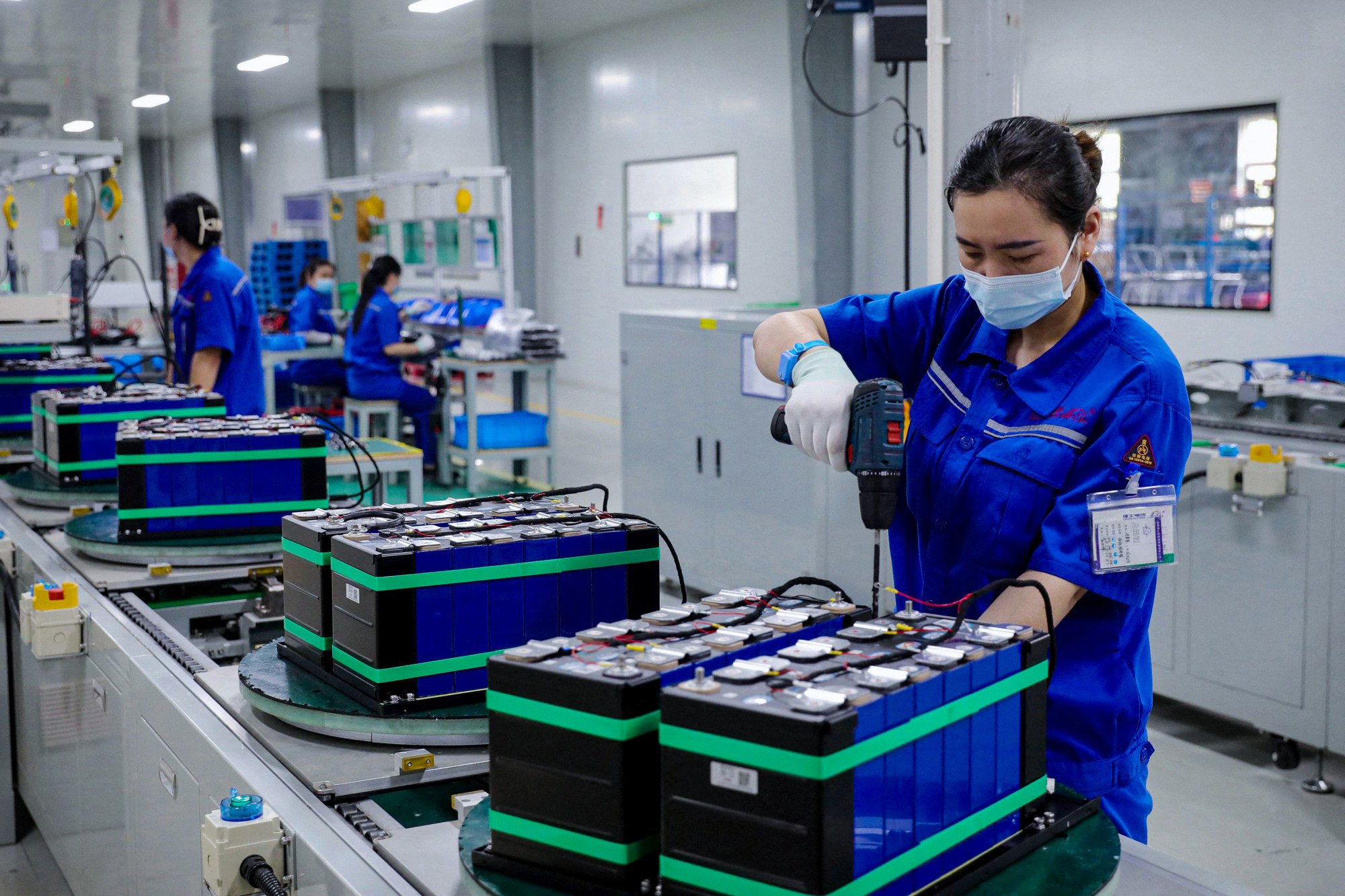A scientist who predicted China’s electric car boom a decade ago says the country’s EV battery industry could expand more than sevenfold, despite existing overcapacity.
Ouyang Minggao, from Tsinghua University’s school of vehicle and mobility, and a leading figure in China’s early EV research projects, told science media platform The Intellectual on Monday that the country’s battery industry could be worth 10 trillion yuan (US$138 billion) in the future.
“No amount of subsidies would work [to boost the EV industry] without breakthroughs in battery technology,” Ouyang said when asked if the advancement of China’s EV industry could be attributed to favourable policies and subsidies.
Do you have questions about the biggest topics and trends from around the world? Get the answers with SCMP Knowledge, our new platform of curated content with explainers, FAQs, analyses and infographics brought to you by our award-winning team.
“With rapid advancements in battery and EV technologies, new manufacturers have entered the market. Consumer education has progressed and the reputation of EVs has grown,” Ouyang said.
“After years of developing expertise, the market has surged in the past three years, achieving a record 6.8 million new energy vehicle sales in 2022. This was almost certainly going to happen despite uncertainties.”

Last year, the lithium-ion battery sector surpassed 1.4 trillion yuan in total output, according to the Ministry of Industry and Information Technology.
Chinese EV and battery manufacturers dominate the global EV supply chain, producing more than 60 per cent of the world’s EVs and 77 per cent of its EV batteries.
The US government responded to China’s outsize influence in the sector this year by imposing 100 per cent tariffs on Chinese-made EVs, a move followed by Canada at 100 per cent and the European Union at up to 35.3 per cent.
The US House of Representatives has also tried to restrict electric vehicle tax credits, which could jeopardise licensing deals between American carmakers and Chinese EV battery companies.
Ouyang said that while China’s battery industry was expanding rapidly, it was facing severe overcapacity.
“In China, regardless of how promising an industry or market may be, the moment it is labelled as a hot sector, overcapacity quickly follows. This is the situation now,” he said.
“Companies need to prioritise profitability. Until they are certain that a technology will become mainstream, they will not invest heavily. The numerous factories being built now are essentially the same as before, which is a key reason for the overcapacity – everyone is doing the same thing.”
But he said that just like the automotive sector, China’s battery industry, which is the fundamental source of energy for the EV industry, had the potential for huge development because of a wide range of battery applications.
“Batteries are used in vehicles, energy storage and consumer electronics. Around 94 per cent of novel energy storage solutions rely on batteries,” he said.
Chinese developers should prepare for future technological upgrades in other countries, Ouyang said, adding that he had started an all-solid-state battery innovation platform to promote collaborations between the industry and researchers.
“Continuous breakthroughs and innovations are emerging in battery technology, so it is essential to guard against disruptive technologies, such as all-solid-state batteries that Japan is aggressively promoting.”
“Due to the ban on Chinese chips, American companies like Tesla may advance their smart technology abilities and widen the gap with Chinese developers. It is crucial to deploy and gain expertise in these advanced technologies strategically,” he said.
All-solid-state batteries have emerged as a possible solution to the limitations of traditional lithium-ion batteries, which contain liquid electrolytes, adding to their weight and increasing the risk of fires.
But high material and manufacturing costs have hindered the widespread adoption of solid-state batteries, igniting a global competition to find a commercially viable solution.
In July, scientists from the University of Science and Technology of China said they had developed a solid-state lithium battery that could match the performance of other candidates for next-generation battery technology at less than 10 per cent of the cost.
In the interview on Monday, Ouyang said he was the “most criticised scientist” in the new energy vehicle field.
A proposal he made in 2021 to set a timeline for phasing out conventional fuel vehicles in Beijing – instead of imposing an immediate ban – sparked heated debate, particularly on social media. Online critics questioned if he was driven by personal business interests, he said.
“When I first started in the field, I would be very rudely rebuked when my views were not the same as those of the academic authorities,” he said.
“For a long time, the annual automotive industry forums during the two sessions were always tense. Some meetings made me feel like they were all about criticising me.”
Ouyang began his career in battery technology in the 1990s, when battery-powered vehicles struggled to travel 100km (62 miles), and few investors believed in their future.
In 2001, when China’s Ministry of Science and Technology launched a plan to develop EVs, Ouyang took on a project to study buses powered by fuel cells.
By 2010, when fewer than 50,000 electric cars were sold each year around the world, Ouyang predicted that within 10 years, new energy vehicles would replace 20 per cent of traditional fuel vehicles, and electricity would become the main alternative to internal combustion engines.
He also anticipated in 2015, when electric vehicles were considered “hopeless and could only rely on subsidies”, that pure electric vehicles would be able to compete with fuel-powered vehicles by 2020, even without subsidies.
More from South China Morning Post:
- BYD to sell Sealion SUV in Europe from 2025 in sign extra tariffs are ‘no big deal’
- With a price war at home spreading overseas, and a tariff war in the US and EU, China’s EV industry is bracing itself despite new tech roll-out
For the latest news from the South China Morning Post download our mobile app. Copyright 2024.





